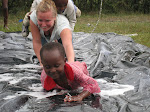AIDS
A disease that has ravaged sub-sahara Africa, infecting over 28 million people. A disease that has killed off older generations of Africans leaving behind millions of orphaned children. A disease that has stalled progress in educational, economic, and development sectors...
"A great many things made Africa particularly susceptible to AIDS, some of them innate to the communities where the disease flourished, and many other imposed from outside. The key factor is poverty. Put simply, millions of Africans are living with a virus from which they might easily have been protected if they had had access to education about it, or to the means of defending themselves... and the destitution and weakness of many sub-saharan states crippled their ability to respond once their populations were infected." - Stephanie Nolan, 28 Stories of AIDS in Africa
Before coming to Tanzania, I knew what HIV/AIDS was but it was never real to me. I had never been personally affected by the disease, I didn't know anybody who was or knew anybody who knew anybody that was - that's how far removed you can be from AIDS in countries like America. But in Africa, it's a completely different story. It is everywhere.
Support for International Change, is an NGO here in Arusha that provides free HIV testing, they were kind enough to come out and test our children. The Foundation for Tomorrow sponsors two little girls who are HIV positive, Rose and Rachel. Every month, they recieve basic checkups from doctors and every three months bloodwork has to be done to measure their CD4 levels. A CD4, Cluster of Differentiation 4, is a type of protein that is found on the surface of helper T cells in the bloodstream. CD4 acts as a receptor as HIV binds to the CD4 in order to enter host cells. The levels of CD4's helps to measure the course of HIV and treatment, when the level drops below 200 is when anti-retroviral treatment will be given to a patient due to minimal supply in Africa.
I had my first monthly check-up visit with Rose last week at Dream Clinic. Africa has its own concept of "time," even when it comes to having appointments. So Rose and I waited and waited for her turn. While Rose was happy drawing away in my notebook and eating the stash of lollipops I had given her, I looked around and watched every man, woman, and child there. There were about thirty people, some waiting for their appointments and others had come to attend an informational session. My heart went out to each one, wondering what their story was... how often do you come to the clinic? how long have you known that you're positive? how is your family? do you have children? are they infected?
The nurse called Rose's name and she strolled into the clinic like it was no big deal. Every doctor and nurse not only knew her name, but stopped to take the time and say hello. This visit happened to be time for a blood test but Rose was so brave. My heart was breaking, holding her hand as she tried not to look at the needle, her lips quivered, and the tears began to fall. Every child I have seen crying here is so much more dramatic than any other I've seen. Maybe its because their faces and cheeks are smaller and thinner? The tears just drop directly from their eyes down to the floor, they dont roll along the cheeks and it just makes the tears so much more profound. But Rose was strong and quickly recovered from the trauma of the blood test -
Rose's CD4 levels are good, for now at least.
I packed some popcorn for the trip, hoping it would help to ease any anxiety a doctors visit might provoke in her, so I broke it out for her after having her blood taken. A smile spread across her face as she took the popcorn and softly said asante. We had to wait a few more minutes to finish up in the clinic and as the other children spotted Rose with the bag of popcorn, they flocked towards her. She generously shared all of her popcorn with 7 other children, so much so that she only had a couple handfuls left for herself - that's just the kind of little girl she is.






No comments:
Post a Comment